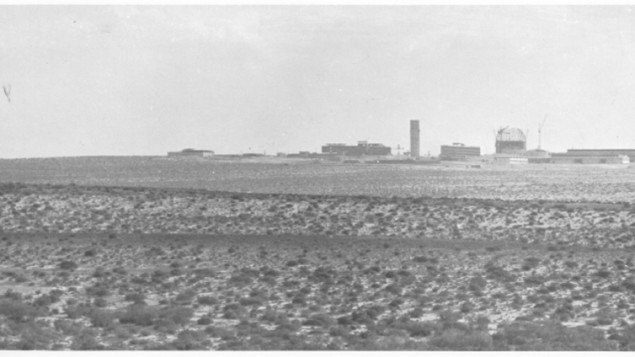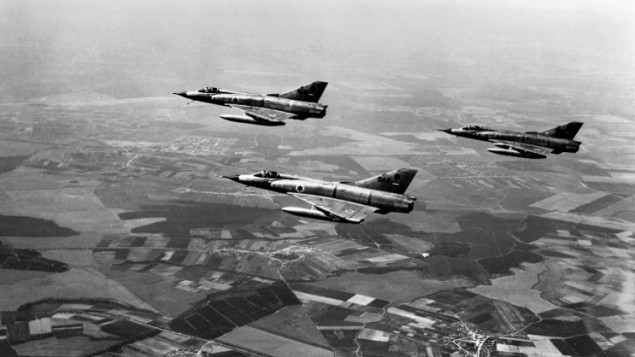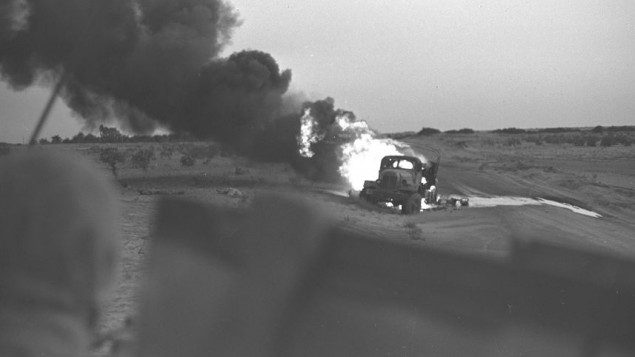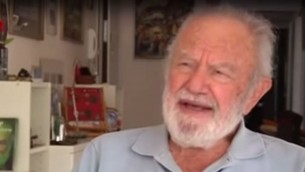New York Times, quoting newly released interview, says the display of nuclear strength was a ‘doomsday’ scenario not needed after IDF victory
One the eve of the Six Day War, with the country surrounded by enemies and unsure of its future, Israel developed a “doomsday” plan to detonate an atomic bomb in Egypt’s Sinai Peninsula as a warning to the Arabs, The New York Times reported Saturday.
The report was based on an interview conducted by leading Israeli nuclear scholar Avner Cohen with retired IDF brigadier general Itzhak Yaakov, who reportedly oversaw the plan.
“It’s the last secret of the 1967 war,” Cohen told the paper.
The full interview is set to be published Monday, as the region marks the 50th anniversary of the war in which Israel defeated the combined Arab armies in just six days.
According to Yaakov, who oversaw weapons development for the Israel military and gave details of the plan to Cohen in 1999 and 2000 interviews, Israel was deeply fearful ahead of the war.
“Look, it was so natural,” Yaakov said, according to the Times, which quoted a transcription of a taped interview. “You’ve got an enemy, and he says he’s going to throw you to the sea. You believe him.”
“How can you stop him?” Yaakov asked. “You scare him. If you’ve got something you can scare him with, you scare him.”
Yaakov, who died in 2013 at age 87, detailed in the interview with Cohen how Israel developed a plan code-named “Shimshon,” or Samson, to have helicopters and commandos fly an atomic device to a mountain top site about 12 miles from an Egyptian military complex at Abu Ageila.
“The plan, if activated by order of the prime minister and military chief of staff, was to send a small paratrooper force to divert the Egyptian Army in the desert area so that a team could lay preparations for the atomic blast,” the report said.
“Two large helicopters were to land, deliver the nuclear device and then create a command post in a mountain creek or canyon. If the order came to detonate, the blinding flash and mushroom cloud would have been seen throughout the Sinai and Negev deserts, and perhaps as far away as Cairo.”
Israel has never acknowledged having nuclear weapons, maintaining a policy of so-called nuclear ambiguity, neither publicly confirming nor denying the existence of an atomic arsenal. However, several top US officials have seemed to confirm it, most recently former secretary of state Colin Powell who wrote in a leaked private email that he believed Israel has some 200 nuclear weapons.
The Israeli Embassy in Washington declined to comment on the report or on Yaakov’s role, The New York Times said.

A photo from the 1960s of the nuclear facility outside Dimona (Flash90/US National Security Archive)
If Israel had detonated a device, it would have been the first use of a nuclear weapon in a war situation since the US dropped the two bombs on Japan to end World War II.
On Monday, the Nuclear Proliferation International History Project of the Woodrow Wilson International Center for Scholars in Washington — where Cohen is a fellow — is releasing on a special website a series of documents related to the Israeli atomic plan.
In the transcripts, Yaakov describes a helicopter flight he made to the site with Israel Dostrovsky, the first director-general of the Israel Atomic Energy Commission, that had to be aborted after the Egyptians scrambled fighter jets.

This file photo taken on June 5, 1967 shows Israeli airforce Dassault Mirage III fighters flying over the Sinai Peninsula at the Israeli-Egyptian border on the first day of the Six Day War. (AFP)
“We got very close,” Yaakov reportedly said. “We saw the mountain, and we saw that there is a place to hide there, in some canyon.”
As it turned out, Israel’s victory was swift and decisive and there was no need for any doomsday plan, but Yaakov still believed Israel should have gone ahead with it and openly declared its nuclear prowess.
“I still think to this day that we should have done it,” he told Cohen, who is the author of “Israel and the Bomb” and “The Worst-Kept Secret.”
In 2001, some 2 years after hisconversations
eration Studies)with Cohen, Yaakov was arrested in Israel and charged with passing secret information with intent to harm state security. The charges related to memoirs he wrote, the Haaretz daily reported in its obituary of Yaakov in 2013.
Yaakov was acquitted of the main charge but found guilty of the unauthorized handing over of secret information, Haaretz said, noting that he received a two-year suspended sentence.
The obituary hinted at the exploits in the Sinai Desert, saying that “Yaakov was one of Israel’s leading officers in the field of weapons development during the build-up to the Six Day War and afterwards. During the war he was appointed to command a complex and unprecedented operation in the Sinai Peninsula, where he was to command both IAF pilots and a special ops unit. The IDF’s rapid success in defeating the Egyptian army made the operation redundant and it was cancelled.”
According to Cohen, he promised Yaakov he would find the right time to publish the information and now, on the 50th anniversary, he believed the time was ripe.





